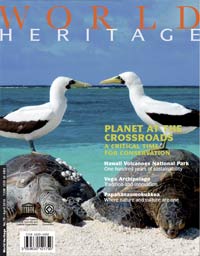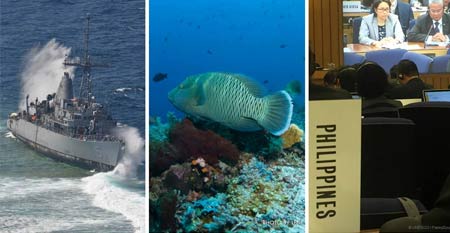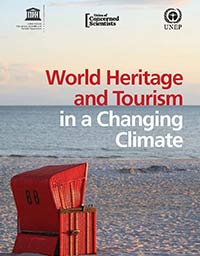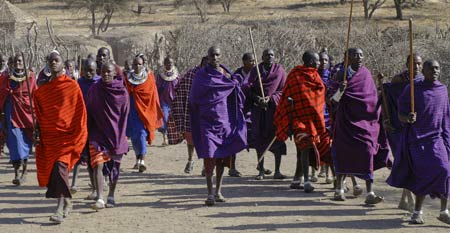|

The World Conservation Congress, an international gathering of nature experts will be held in Hawaii (United States) from 1 to 10 September 2016.
In preparation for this important event, World Heritage looks at sustainable development and conservation issues at various sites, and presents the two Hawaiian World Heritage sites, Papahānaumokuākea and Hawaii Volcanoes National Park. The issue also features an interview with Aroha Mead, Chair of IUCN’s Commission on Environmental, Economic and Social Policy.
To read the issue online: http://whc.unesco.org/en/review/79/
To subscribe to World Heritage: http://whc.unesco.org/en/review/
|
|

The first African World Heritage Day was celebrated on 5 May 2016. The goal of this International Day, proclaimed by UNESCO Member States in November 2015, is to “increase global awareness of African heritage and to mobilize greater cooperation for its safeguarding,” according to Irina Bokova, Director-General of UNESCO. “Of the 129 cultural and natural sites on the African continent inscribed on the World Heritage List, 17 are also on the List of World Heritage in Danger,” points out Ms Bokova.
As part of the celebrations, a photo exhibit entitled “African World Heritage: a pathway for development”, currently displayed at UNESCO Headquarters in Paris, France, can be viewed online here.
The photos, taken at eight African World Heritage sites, show how heritage conservation contributes to socio-economic and cultural development of Africa in various themes ways: through sustainable towns, protection of the environment, women’s role in heritage conservation, the mobilization of young people in heritage protection, and other themes.
|
|

Following years of preparation, the Tubbataha Reefs Natural Park in the Philippines has received an “in principle” approval as a Particularly Sensitive Sea Area (PSSA) from the International Maritime Organization’s (IMO) Marine Environment Protection Committee (MEPC). The endorsement is a major breakthrough in securing protection from the impacts of international shipping for the World Heritage site and a substantial step toward preventing future ship groundings.
The proposed measure will safeguard the Tubbataha Reefs Natural Park as an “Area to be Avoided” and will apply to all vessels, over 150 gross tonnes, shipping goods through the Sulu Sea, a major international shipping route for the transportation of goods.
The Marine Programme is also helping Banc d'Arguin National Park in Mauritania to get a similar type of protection.
|
|

Climate change is fast becoming one of the most significant risks for World Heritage sites, according to the report “World Heritage and Tourism in a Changing Climate” released on 26 May by UNESCO, the United Nations Environment Program (UNEP), and the Union of Concerned Scientists (UCS).
The new report lists 31 natural and cultural World Heritage sites in 29 countries that are vulnerable to increasing temperatures, melting glaciers, rising seas, intensifying weather events, worsening droughts and longer wildfire seasons. It documents climate impacts at iconic tourism sites—including Venice, Stonehenge and the Galápagos Islands—and other World Heritage sites such as South Africa’s Cape Floral Region Protected Areas; the Port, Fortresses and city of Cartagena, Colombia; and Shiretoko peninsula in Japan. These are only a selection of World Heritage sites affected by climate change.
The new report lists 31 natural and cultural World Heritage sites in 29 countries that are vulnerable to increasing temperatures, melting glaciers, rising seas, intensifying weather events, worsening droughts and longer wildfire seasons. It documents climate impacts at iconic tourism sites—including Venice, Stonehenge and the Galápagos Islands—and other World Heritage sites such as South Africa’s Cape Floral Region Protected Areas; the Port, Fortresses and city of Cartagena, Colombia; and Shiretoko peninsula in Japan. These are only a selection of World Heritage sites affected by climate change.
The publication can be downloaded in pdf format here.
|
|

Experts from nearly 40 countries, including 12 outside the Africa region, gathered in Arusha (Tanzania) for the international conference "Safeguarding African World Heritage as a Driver of Sustainable Development" co-organized by the UNESCO World Heritage Centre, the United Republic of Tanzania and the People's Republic of China, from 31 May to 3 June 2016.
At the end of the 4-day conference at the World Heritage site of Ngorongoro Conservation Area, the participants adopted a declaration reaffirming the importance of heritage for preserving and promoting culture, and as a driver of sustainable development.
|
|
|